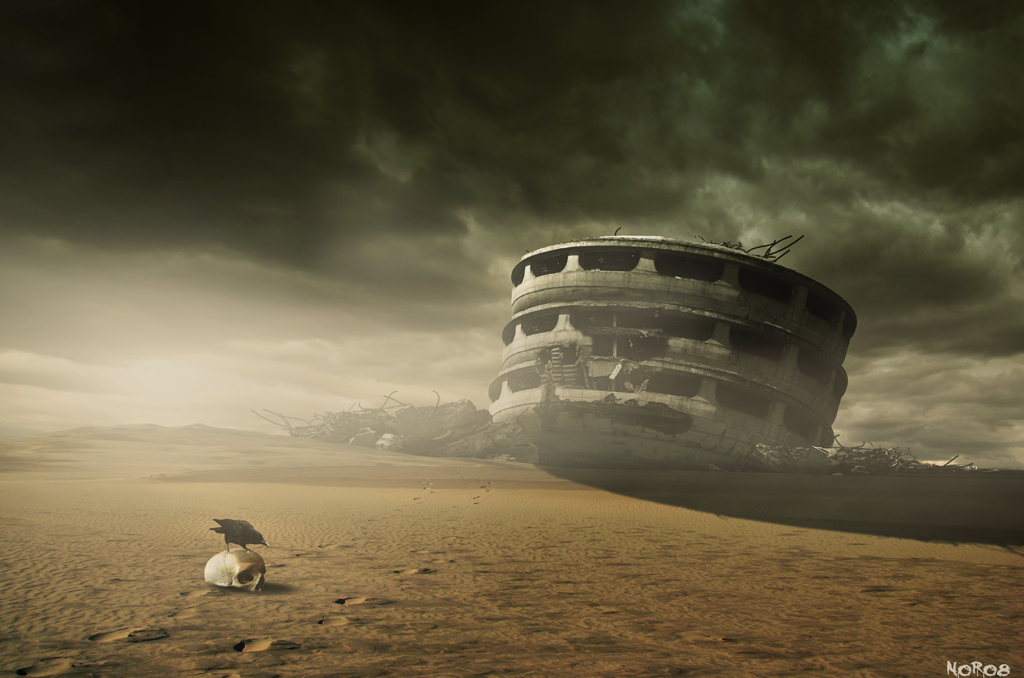Entry tags:
A Hundred Millennia From Now
 I need a little help from my readers for a fiction project in the early conceptual changes.
I need a little help from my readers for a fiction project in the early conceptual changes. I'm trying to find accurate information about the enduring legacies of modern industrial civilization. Assume that our civilization circles through the normal cycle of decline and fall. Assume that ordinary history continues for the next hundred thousand years or so. Assume that ordinary ecological and climatic cycles, perturbed by our current mess, return to normal in a reasonable period of time and persist for that same very long period. What traces will remain of the earth's first global technic civilization?
What I would like, if any of my readers can point me to this, are some easily accessible written sources by geologists and other people literate in the earth sciences which address this. Yes, I'm beginning to draft a story set in the far future; no, it's not going to be the fake future of so much bad science fiction, in which today's mental and cultural habits remain frozen in place across the ages while technotrinkets lurch into ever more elaborately predictable forms. We never went to the stars, nor did alien space bats ever come to visit us; life has continued to evolve; today's industrial society, the legendary First Technate, is a dim presence long since fallen out of mythology, and recalled only in fragmentary surviving records from less prodigiously ancient societies.
Oh, and there's a new ice age on, though the glaciers are slowly beginning to retreat. Fun times!
If any of you have scientifically based sources to suggest for the long-term destinies of our mines and freeways, dams and tunnels, landfills and miscellaneous waste, I'm all ears.
no subject
(Anonymous) 2023-06-04 04:12 am (UTC)(link)https://www.researchgate.net/figure/Expected-lifespan-and-causes-of-failure-of-steel-products-shows-that-the-average_fig10_281127566
https://theconversation.com/the-problem-with-reinforced-concrete-56078
Faster infrastructure destruction if a big geologic event happens such as:
- For frequency of dinosaur mass extinction asteroid hits:
https://skyandtelescope.org/astronomy-news/how-often-do-chicxulub-level-asteroids-hit-earth/.
- The magnetic North Pole right now is wandering faster than in previous decades in the last 30 or so years. We are due for a magnetic pole flip. Plays havoc with the protective Van Allen Belts keeping radiation off the planet's current major population centers. Easy way to fry unshielded electronics.
https://www.nationalgeographic.com/science/article/earth-magnetic-field-flip-north-south-poles-science
- Solar flare mega pulses which can wipe out most life forms not underground or unprotected but for tardigrades and, one assumes, cockroaches.
https://www.livescience.com/miyake-events-mystery-deepens
What happens if all three of those occur in the same time frame? Not good. Then consider this horror show:
A "normal" planet Earth volcanic extinction level event such as the massive basalt flows now cut through by the Columbia River between Oregon and Washington State right near the Hanford nuke Superfund sites, ditto the Siberian and Deccan traps:
https://news.mit.edu/2015/siberian-traps-end-permian-extinction-0916
To have glaciers retreating and a new Ice Age starting, I'd think there'd have to be at least one of those massive geologic and.or solar system events to skew the normal global weather patterns. Or maybe a massive asteroid hitting the Moon and playing havoc on Earth's winds and tides, or perhaps one changing the spin of the Earth. Maybe something with the SAA?
https://www.nasa.gov/feature/nasa-researchers-track-slowly-splitting-dent-in-earth-s-magnetic-field
W.R.
no subject
(Anonymous) 2023-06-04 06:18 am (UTC)(link)https://theswaddle.com/a-book-that-imagines-life-after-people/
I don't think plastic will stay around much, nature has a way to kill it already, ultraviolet rays
no subject
no subject